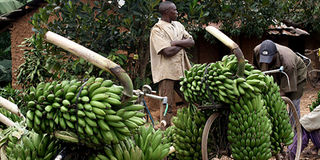Agrochemical body says, GMOs won’t drive us out

A man stands beside a bunch of bananas. An agrochemical body says GMO' wont kill their business. PHOTO/FILE
An industry lobby has attempted to allay fears of loss of business for local pesticide and fertiliser makers when genetically modified crops are fully adopted in Kenya.
Proponents of biotechnology claim these crops can greatly reduce the amount of pesticides and fertilisers needed. This, among other factors, is said to be fuelling pesticide makers’ stiff opposition to the genetically modified crops.
Richard Shikuku, chief executive officer of the Agrochemicals Association of Kenya (AAK), says the technology is good for building up the country’s food reserves, and the adoption of GMOs will not kill the pesticides business.
AAK is the umbrella organisation in Kenya for manufacturers, formulators, re-packers, importers, distributors, farmers and users of pest control products (pesticides).
Closure
“We always advocate an integrated approach to technologies in production. Pesticides are just one of the ways to manage production, and we take everything into consideration,” Mr Shikuku told the Sunday Nation.
He said that even if the adoption of GMOs grows in Kenya, it doesn’t mean the use of pesticides would decline to such levels to force the closure of businesses since even today their products are used as a last resort.
“Fertilisers are also here to stay,” he said.
Farmers use many tonnes of chemical pesticides annually to stave off huge crop losses. However, due to changing world trends, consumers do not want to eat food from crops treated with pesticides due to potential health hazards.
Runoff into rivers of agricultural waste from excessive use of pesticides and fertilisers can poison water supply and cause harm to the environment.
Proponents of biotech foods claim they achieve higher yield by improving productivity and survival in drought prone regions, and by producing pest-resistant and stress-tolerant crops.
Although GMOs elicit strong opposition, Dr Clive James, founder and chair of ISAAA (The International Service for the Acquisition of Agri-biotech Applications) says the technology is of benefit to the environment because it eliminates the use of toxic agricultural pesticides, fertiliser and other soil treatments.
Dr Florence Wambugu of the Africa Harvest Biotech Foundation International believes African countries “must use all technologies to address the challenges facing agriculture”.
“The opposition to biotechnology is engineered by groups that suspect they will lose in their businesses once there is full adoption of genetically modified crops. Ask the pesticides manufacturers,” Dr Wambugu said.
Despite the vocal opposition, the Kenya Agricultural Research Institute (KARI) has already adopted Bt maize which is more resistant to crop pests like the stem borer.
KARI hopes the variety will be resistant and boost maize productivity; trials are planned to test the resilience of the breed.
It is estimated that 400,000 tonnes of maize, nearly the amount imported into Kenya annually, are lost to pests, especially the maize stock borer.
Trials of genetically modified cotton are underway to increase production that peaked at 70,000 bales in Kenya in 1986.
That is equal to what Kenya requires today to be self-sustainable. Production dropped to 25,000 bales last year.
The country has an annual potential for 260,000 bales. The Bt variety is preferred because it requires less pesticide and doubles the yield of non cotton.
Cotton is generally a pesticide-intensive crop; a KARI survey indicated that 35 per cent of farmers interviewed cited the cost of pesticides as the biggest constraint to growing cotton. Trials of such Bt crops has been made possible following presidential assent to the Bio-safety Bill 2008 in February this year.
The government passed the law principally with a view to using the technology to increase food production, although groups like the Kenya Biodiversity Coalition have opposed the law saying it will result in negative environmental consequences.
Why the opposition? Many say that the hidden big issue is not that GMO crops are unsafe; the problem with GMO seeds is that they are invariably patented.
Critics say that Monsanto is doing everything in order to secure a monopoly: Making safe food in massive quantities even if its nutrient content is at par with iceberg lettuce, doing it cheaply in order to drive family farms out of business and offering family farms deals so that they will buy Monsanto seeds.
With enough people locked in, it becomes less apparent that natural farming is a viable option —even though it always was.
As an alternative, GM foods can be genetically engineered to be more resistant to certain pests which helps eliminate the need for chemical pesticides.




